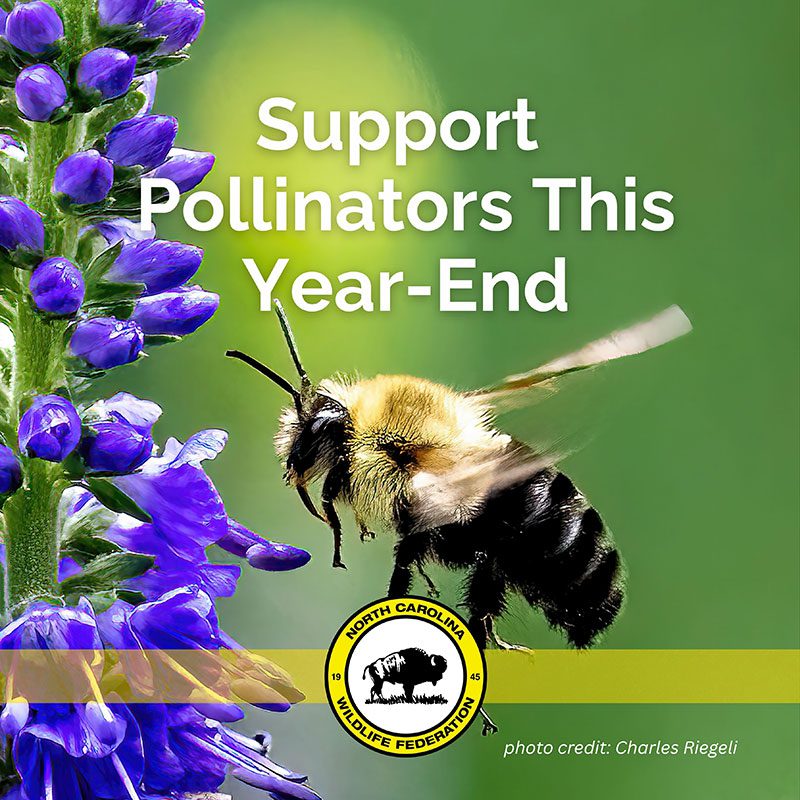Connecting People to Nature: Your Guide to NCWF’s Wildlife Programming, and How You Can Participate
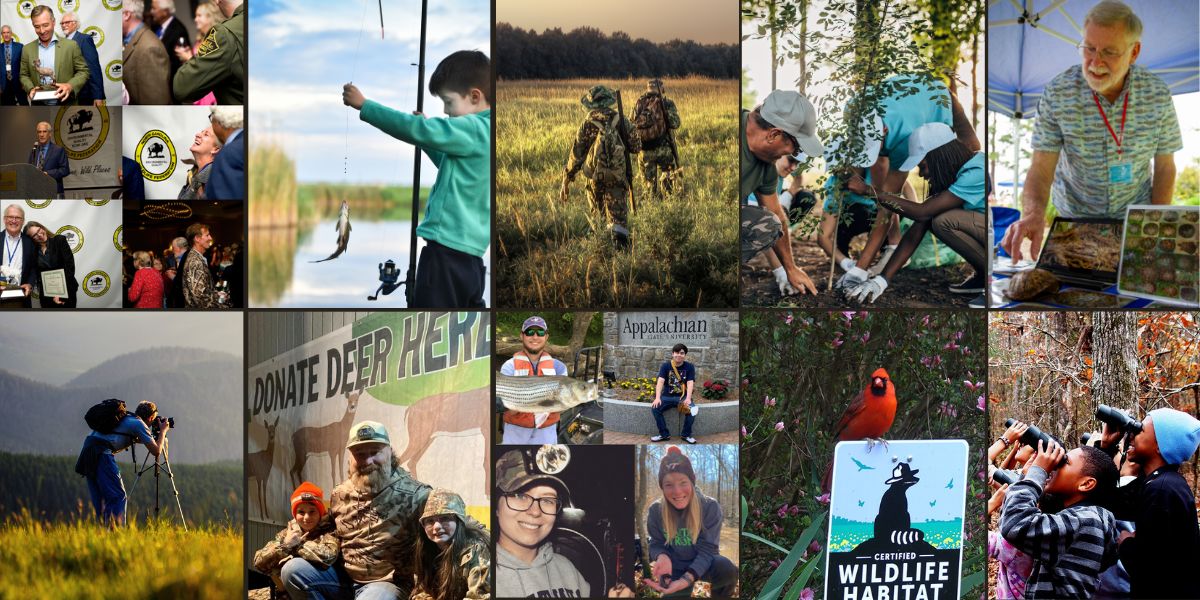
You’re here for a reason.
Maybe it traces back to cherished memories of fishing with a grandparent, or the awe-inspiring moments of a childhood zoo visit. Maybe it’s rooted in the profound loss you felt when a local woodlot you frequented as a child disappeared, or in the simple joy of capturing fireflies in jars on summer evenings.
Your own story and reasoning around engaging with wildlife and habitat is a unique one. But regardless of what that story is – this much is clear. You’re part of a vast community of conservationists and wildlife enthusiasts, each with their own unique path that led them here – their own way of connecting to wildlife.
And, luckily, those stories have legs… and hold critical implications for the future.
The children exploring zoos today may become the wildlife biologists of tomorrow. Today’s bug-catchers of may become the entomologists of the future. And those growing up witnessing the loss of wildlife habitat in their own neighborhood may well become its most passionate defenders.
In a world where rapid development and habitat degradation threaten our natural spaces, we have a responsibility to build a new generation of wildlife protectors, a legacy for wildlife. And that starts here and now, with every one of us within this community.
NCWF’s Conservation Impact Plan highlights this mission to enhance and expand educational opportunities around wildlife for youth and adults, and mobilize people and communities to achieve local and statewide habitat goals.
Join us this month as we celebrate the beauty and importance of connecting communities, children, and families with wildlife.
Connecting to Nature: Statewide Opportunities
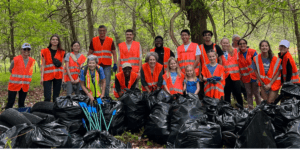
Community Wildlife Chapters:
North Carolina Wildlife Federation chapters serve as community-based entities collectively forming a cohesive, statewide network of wildlife enthusiasts dedicated to wildlife and habitat conservation.
This network of local NCWF Community Wildlife Chapters is pivotal in achieving our shared mission and objectives. Leveraging NCWF’s strengths in education, advocacy, grassroots mobilization, outdoor activities, and policy expertise, our chapters play a crucial role.
Each Community Wildlife Chapter is uniquely crafted to empower local wildlife enthusiasts, including anglers, backpackers, birders, hunters, gardeners, and hikers, enabling them to make a direct and impactful contribution to wildlife conservation in their communities and beyond. These chapters organize nature programs, conduct field trips, and engage in wildlife projects within their communities.
FIND A COMMUNITY WILDLIFE CHAPTER NEAR YOU
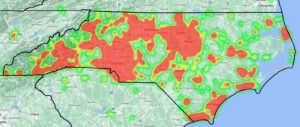
Butterfly Highway Heat Map
Butterfly Highway:
The Butterfly Highway initiative is a statewide conservation restoration effort aimed at restoring native pollinator habitats in areas affected by urbanization, land use changes, and agricultural practices across North Carolina. From small-scale Pollinator Pitstops in backyard gardens to large-scale roadside habitat restoration projects, this initiative is establishing a network of native flowering plants to support butterflies, bees, birds, and other pollen and nectar-dependent wildlife.
You can transform your yard or garden into a registered Pollinator Pitstop by taking simple measures to provide critical habitat for butterflies and other pollinators. Registering your yard, subscribing to our weekly Butterfly Highway e-newsletter, planting native pollinator seeds, or purchasing a Butterfly Highway sign are all ways to contribute to this vital conservation effort.
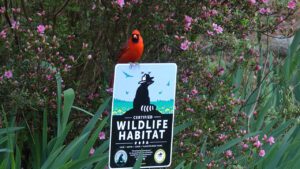
Photo By: Christine McCluskey
Certified Wildlife Habitat:
North Carolina Wildlife Federation supports wildlife habitat, garden, and restoration programs tailored to the flora and fauna native to our state.
Since 1973, the National Wildlife Federation’s Garden for Wildlife programs have been educating and empowering individuals to transform their yards and gardens into thriving habitats for birds, butterflies, and other wildlife.
Both NWF and NCWF recognize that every wildlife habitat is a step toward replenishing resources for wildlife locally and along migratory corridors.
Show your commitment to wildlife by certifying your yard, balcony container garden, schoolyard, workplace landscape, or roadside greenspace as a Certified Wildlife Habitat®. It’s a fun, easy process that makes a big difference for neighborhood wildlife.
MAKE YOUR YARD A CERTIFIED WILDLIFE HABITAT
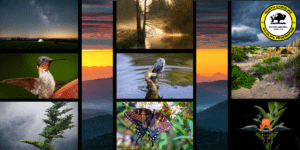
Photo Contest:
Photographs are powerful storytellers, capturing beauty, preserving memories, and sharing remarkable narratives. Each summer, alongside hundreds of other photographers, you have the chance to narrate the story of North Carolina wildlife through NCWF’s Sixth Annual Wildlife Photo Contest. NCWF welcomes submissions from professional, amateur, and youth photographers, showcasing the endless array of subjects from green anoles in backyard gardens to elk navigating mountain streams, or brown pelicans fishing along the coast of the Outer Banks.
The submission period runs from July 1 to September 1, with categories including Carolina Critters, People in Nature, Scenes of North Carolina, and Pollinators and Insects. The goal is to spotlight the wildlife and natural beauty of North Carolina, whether it’s in your backyard or across the state.
SUBMIT YOUR PHOTO TO THE 6TH ANNUAL NCWF WILDLIFE PHOTO CONTEST
Connecting to Nature – Opportunities for Children and Families
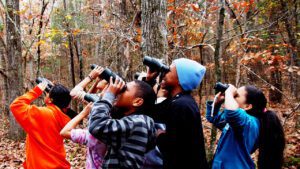
Great Outdoors University:
Nature offers boundless lessons, inspiring creativity, fostering community, promoting activity, and enhancing personal well-being. It serves as a classroom where we not only learn about the world around us but also about ourselves.
Despite the vast opportunities presented by the outdoors, many individuals, particularly children, are deprived of these experiences due to various modern-day factors, including limited access and competing interests such as screen activities.
Great Outdoors University (GoU) addresses this disparity by providing access and opportunities to children and families statewide. By breaking down barriers to outdoor engagement, GoU aims to instill in children an appreciation for nature and their role as stewards of the environment through connecting to wildlife in their own area.
FIND OUT MORE ABOUT GREAT OUTDOORS UNIVERSITY
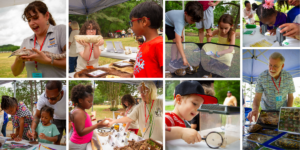
Kids In Nature Days:
As part of its mission, the North Carolina Wildlife Federation seeks to broaden opportunities for youth and adults to connect with wildlife and understand the significance of healthy habitats in sustaining ecosystems.
Kids in Nature events exemplify this commitment by offering children and adults alike the chance to engage with nature firsthand, with the hope of inspiring future conservationists and connecting them with nature and wildlife.
The impact of Kids in Nature Days is profound, as evidenced by the enthusiastic participation of individuals of all ages in nature-related activities. These events foster genuine fellowship and camaraderie among participants and conservationists, reinforcing the importance of protecting and restoring North Carolina’s wildlife and habitats for generations to come.
FIND OUT MORE ABOUT KIDS IN NATURE DAYS
Connecting to Nature – Hunting and Angling Programs
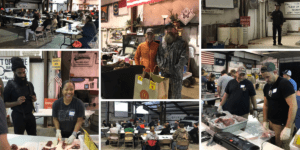
Getting Started Outdoors:
GSO hunting workshops aim to address barriers to entry for individuals interested in hunting but unsure of where to begin. These workshops provide a supportive environment for newcomers, offering mentorship to those lacking in opportunities for connecting to the hunting community.
Participants in GSO workshops receive comprehensive instruction in hunting skills and strategies, preparing them for independent or accompanied hunting experiences. Attendance is available by request only.
FIND OUT MORE ABOUT GETTTING STARTED OUTDOORS PROGRAMS
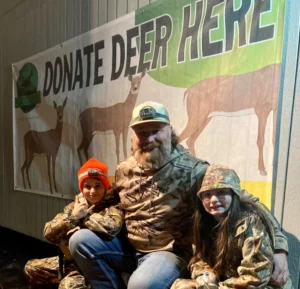
Joey Dalessio and his children after their family hunting trip.
Deer Donation Program:
The NC Wildlife Federation’s Deer Donation Program facilitates collaboration among landowners, hunters, and community groups to manage white-tailed deer populations sustainably. By reducing crop damage, mitigating disease spread, and preventing deer-related accidents, this program benefits both farmers and communities.
In partnership with NC Hunters for the Hungry, the program annually donates approximately 60,000 pounds of venison to local food banks and shelters, serving as a model for addressing deer overpopulation challenges statewide.
FIND OUT MORE ABOUT THE DEER DONATION PROGRAM
Connecting to Nature – Governor’s Awards and Scholarships
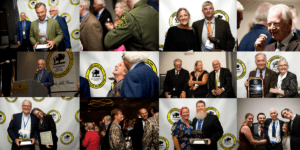
59th Annual Governor’s Achievement Awards.
Governor’s Conservation Achievement Awards
The Governor’s Conservation Achievement Awards honor individuals, associations, businesses and others who have exhibited an unwavering commitment to conservation in North Carolina.
By recognizing, publicizing and honoring these conservation leaders – from professionals and volunteers to young conservationists and lifelong conservation heroes – the North Carolina Wildlife Federation hopes to inspire all North Carolinians to take a more active role in protecting the natural resources of our state. The awards committee is composed of qualified and dedicated conservationists who review all nominations and select the winners, who are recognized at our annual Governor’s Conservation Achievement Awards Ceremony.
NCWF’s 60th Annual Governor’s Conservation Achievement Awards will take place in May of 2025.
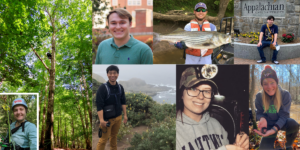
North Carolina Wildlife Federation’s 2022 conservation scholarship winners.
Scholarships:
Since the 1970s, North Carolina Wildlife Federation has awarded scholarships to more than 300 college students from across the state to follow their dreams of studying and working in the wildlife and conservation fields.
NCWF provides up to seven grants to full-time students (graduate or undergraduate) who are enrolled in and attending an accredited NC college or university, including two-year programs. Eligible students must be majoring in the areas of wildlife, fisheries, forestry, conservation or the environment.
We appreciate the opportunity to identify and recognize deserving students and provide scholarship aid. Need and socio-economic elements are considered, and a good record of scholarship and extra-curricular involvement has an impact on final decisions.
FIND OUT MORE ABOUT NCWF’S SCHOLARSHIP OPPORTUNITIES
Connecting to Nature: Opportunities on Location
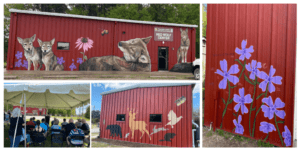
Red Wolf Center at Pocosin Lakes National Wildlife Refuge
Operated by the NCWF, the Red Wolf Center at Pocosin Lakes National Wildlife Refuge hosts an enclosure showcasing captive Red Wolves and offers year-round educational programming. Plan a visit to the Red Wolf Center in Columbia, NC, at the Pocosin Lakes National Wildlife Refuge. In the public viewing area, visitors can witness Red Wolves up close, observing their behavior firsthand. Within the educational building, mounted specimens, including two coyotes, three Red Wolves, and a gray wolf, provide an opportunity to compare species and grasp the unique characteristics of Red Wolves among their canine relatives. Even if you’re unable to visit in person, cameras installed in the den and enclosure offer glimpses into the daily lives and behaviors of this remarkable species.
FIND OUT MORE ABOUT THE RED WOLF RECOVERY PROGRAM
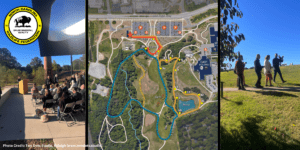
The All Access Eco Trail at the North Carolina Museum of Art
Developed in collaboration between NCMA and the North Carolina Wildlife Federation, the All-Access Eco Trail features braille and tactile signs, along with full audio descriptions, catering to both visually impaired and sighted visitors.
Participants are guided along a pathway traversing diverse habitats with abundant wildlife. Depending on the chosen route, the trail spans between 0.25 and 0.75 miles. The trail aims to offer free and accessible opportunities for education about North Carolina wildlife and habitats, as well as a serene outdoor recreational experience, accessible to individuals of all physical abilities.
EXPERIENCE THE ALL ACCESS ECO TRAIL
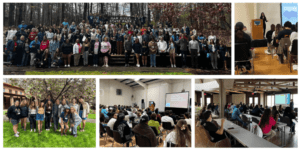
Ocean Advocacy Workshop
The North Carolina Ocean Advocacy Workshop (OAW) is a comprehensive program designed to empower participants to advocate for ocean conservation and environmental stewardship. Each year, students engage in a two-day workshop focused on local and state environmental issues, equipping attendees with the tools to become effective environmental champions through social media, civic action, and political engagement.
Sponsored by the North Carolina Wildlife Federation, the University of North Carolina Greensboro’s Sustainability Environment Program, the UNCG Green Fund, and the Plastic Ocean Project, participants will delve into topics such as ocean plastics pollution, addressing ecogrief, the challenges facing NC fisheries, and advocating for the rights of nature through legal channels, among other pertinent issues.


